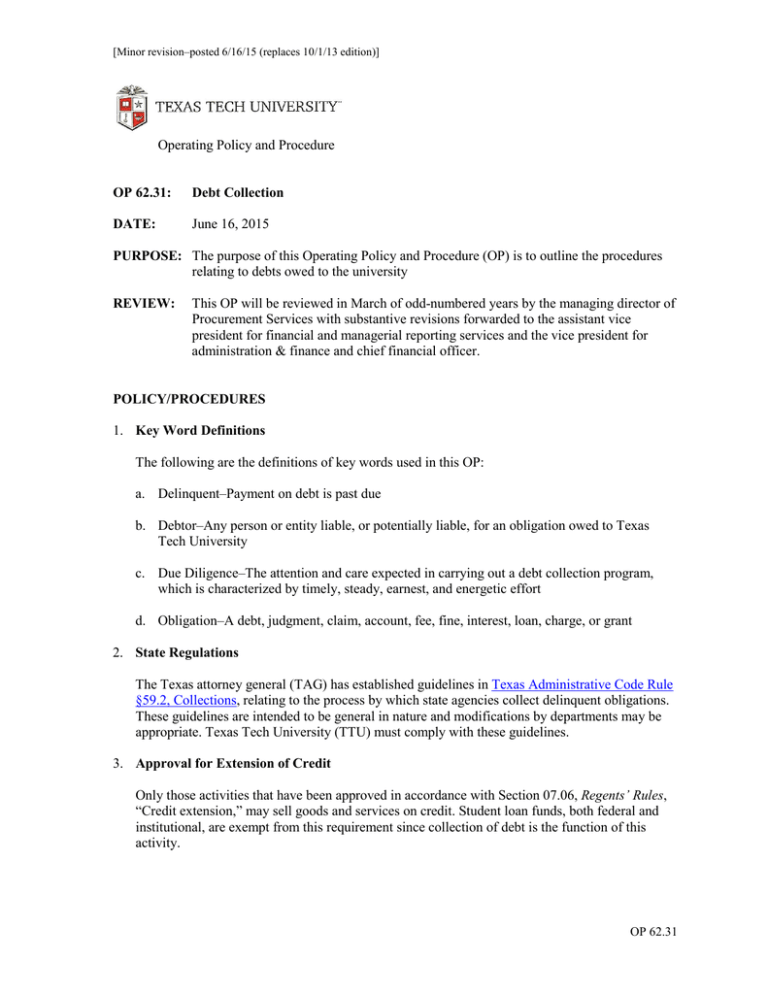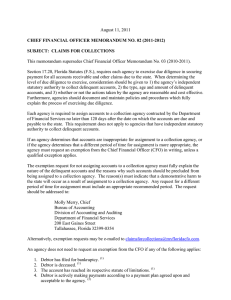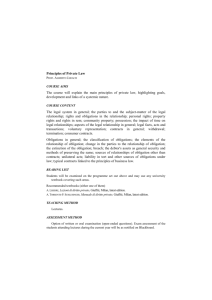Operating Policy and Procedure June 16, 2015
advertisement

[Minor revision–posted 6/16/15 (replaces 10/1/13 edition)] Operating Policy and Procedure OP 62.31: Debt Collection DATE: June 16, 2015 PURPOSE: The purpose of this Operating Policy and Procedure (OP) is to outline the procedures relating to debts owed to the university REVIEW: This OP will be reviewed in March of odd-numbered years by the managing director of Procurement Services with substantive revisions forwarded to the assistant vice president for financial and managerial reporting services and the vice president for administration & finance and chief financial officer. POLICY/PROCEDURES 1. Key Word Definitions The following are the definitions of key words used in this OP: a. Delinquent–Payment on debt is past due b. Debtor–Any person or entity liable, or potentially liable, for an obligation owed to Texas Tech University c. Due Diligence–The attention and care expected in carrying out a debt collection program, which is characterized by timely, steady, earnest, and energetic effort d. Obligation–A debt, judgment, claim, account, fee, fine, interest, loan, charge, or grant 2. State Regulations The Texas attorney general (TAG) has established guidelines in Texas Administrative Code Rule §59.2, Collections, relating to the process by which state agencies collect delinquent obligations. These guidelines are intended to be general in nature and modifications by departments may be appropriate. Texas Tech University (TTU) must comply with these guidelines. 3. Approval for Extension of Credit Only those activities that have been approved in accordance with Section 07.06, Regents’ Rules, “Credit extension,” may sell goods and services on credit. Student loan funds, both federal and institutional, are exempt from this requirement since collection of debt is the function of this activity. OP 62.31 June 16, 2015 Page 2 4. Due Diligence Due diligence shall be practiced in the collection of debt. The TAG due diligence documentation regulations require the maintenance of: a. Copies of all correspondence between TTU and the debtor; b. Documentation reflecting attempted contacts with debtor and the result of such attempts; c. A record of all payments made by debtor and, where practical, copies of any checks tendered as payment; d. Current information verifying debtor's place of business, the residential address and assets; and e. Copies of any document creating the obligation, e.g., promissory note, invoice, etc. 5. Use of Outside Collection Agencies a. TTU may not contract with an outside collection agency without prior written approval of the TAG. Contracts with collection agencies should go through the proper procurement procedures administered by the Procurement Services Office. b. In addition to information required by other state laws, all contracts for collection of delinquent obligations must contain or be supported by a proposal containing the following: (1) A description of the obligations to be collected sufficient to enable the attorney general to determine what measures are necessary to attempt to collect the obligation(s); (2) Explicit terms of the basis of any fee or payment for the collection of the obligation(s); (3) A description of the individual accounts to be collected in the following respects: (a) The total number of delinquent accounts; (b) The dollar range; (c) The total dollar amount; (d) A summary of the collection efforts previously made by the agency; and (e) The legal basis of the delinquent obligations to be collected. c. Requirements of proposed contracts with private persons presented for attorney general approval All contracts for collection of delinquent obligations should contain provisions stating that: (1) Litigation on the delinquent account is prohibited unless the private person obtains specific written authorization from the university and the attorney general and complies with the requirements of this rule; OP 62.31 June 16, 2015 Page 3 (2) The person is required to place any funds collected in an interest bearing account with amounts collected, plus interest, less collections costs, payable to the university on a monthly basis or by direct deposit to the university's account on a weekly basis with the university billing once a month. In either case, a listing of the accounts and amounts collected per account should be submitted to the university upon deposit of the funds; (3) The person refer any bankruptcy notice to the university within three working days of receipt; (4) The university may recall any account without charge; (5) The person may not settle or compromise the account for less than the full amount owed (including collection costs where authorized by statute or terms of the obligation) without written authority from the university; (6) The person is not an agent of the university but is an independent contractor, and providing further that the person will indemnify the university for any loss incurred by his/her violation of state and federal debt collection statutes or by the negligence of the person, his employees, or agents; (7) Any dispute arising under the contract be submitted to a court of competent jurisdiction in Texas unless any other venue is statutorily mandated, in which case the specific venue statute will apply, subject to any alternative dispute resolution procedures adopted by the university. It will then be the responsibility of managing director of Procurement Services to forward this information to the TAG, with the consent of the vice chancellor/general counsel. The managing director of Procurement Services will notify the requesting department of the TAG's decision and will begin processing the contract documents, if approved. OP 62.31




